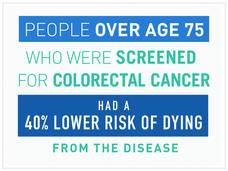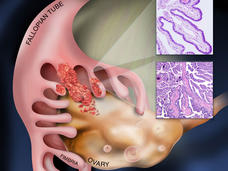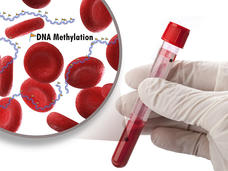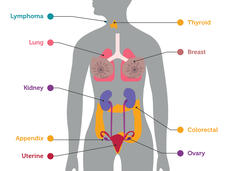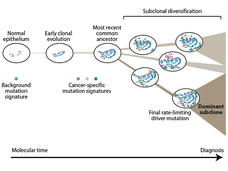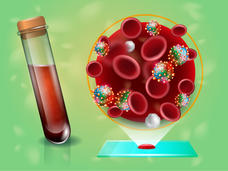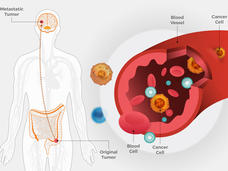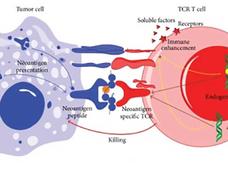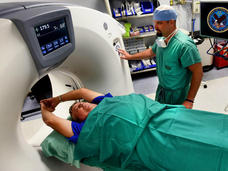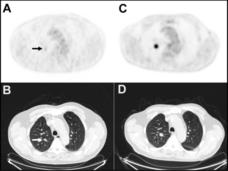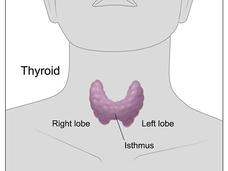Screening & Early Detection - Cancer Currents Blog
News about research on cancer screening and early detection. Includes stories on the impact of screening, new technologies, and approaches to improving the safety and efficacy of screening.
-
Why Have Thyroid Cancer Diagnoses Spiked for US Women?
Women are far more likely than men to be diagnosed with small thyroid cancers that probably would have never caused problems during their lifetime, a new study finds. The results may help explain why thyroid cancer seems to be more common in women.
-
Advancing Cancer Prevention: A Conversation with NCI’s Dr. Philip Castle
The director of NCI’s Division of Cancer Prevention, Dr. Philip Castle, discusses the division’s priority areas and his vision for making more rapid progress in cancer prevention, including moving toward precision prevention and immunoprevention.
-
Could a Diabetes Diagnosis Help Detect Pancreatic Cancer Early?
Numerous studies have pointed to a link between new-onset diabetes and pancreatic cancer. Now, several large NCI-supported studies are testing ways to pick out those people whose diabetes might be a sign of early pancreatic cancer, when treatments may be more effective.
-
Should People Over Age 75 Be Screened for Colorectal Cancer?
Screening people for colorectal cancer after age 75 may be beneficial, a new study suggests. The findings provide helpful information for physicians to use in discussing screening choices with their older patients.
-
Texting May Help Reduce Disparities in Colorectal Cancer Screening
Combining text messaging with mailing people free at-home FIT kits helped increase screening for colorectal cancer among a predominantly Black population, a new study has found. It’s part of a larger effort to reduce disparities in cancer screening.
-
For Cancer Screening, COVID-19 Pandemic Creates Obstacles, Opportunities
After a steep drop in screening for common cancers early in the COVID-19 pandemic, researchers are now exploring ways to improve cancer screening during the current crisis and beyond.
-
ACS’s Updated Cervical Cancer Screening Guidelines Explained
Updated cervical cancer screening guidelines from the American Cancer Society recommend HPV testing as the preferred approach. NCI’s Dr. Nicolas Wentzensen explains the changes and how they compare with other cervical cancer screening recommendations.
-
Many Older Adults Screened Unnecessarily for Common Cancers
Many older adults are being screened for cancer who no longer need to be, a new study shows. Based on a nationwide survey, the study found that at least half of older US adults had received at least one unnecessary cancer screening test in the previous few years.
-
How Does Ovarian Cancer Form? A New Study Points to MicroRNA
A microRNA—a molecule made by cells to turn genes on and off—called miR-181a may help high-grade serous ovarian cancer form, a study has found. The scientists think the microRNA could potentially help doctors detect ovarian cancer earlier.
-
Liquid Biopsy Detects Brain Cancer and Early-Stage Kidney Cancer
Results from two studies show that a liquid biopsy that analyzes DNA in blood accurately detected kidney cancer at early and more advanced stages and identified and classified different types of brain tumors.
-
Study Examines Whether Blood Test Can Identify Early Cancers
A blood test combined with imaging tests detected tumors—some at an early stage—in women with no history of cancer or symptoms, a recent study showed. The test also mistakenly indicated some women had cancer when further testing showed they didn't.
-
Mapping Cancer Genomic Evolution Offers Insights into Tumor Development
Scientists have mapped the evolution of 38 cancer types, noting common gene and protein alterations that occur early, in the middle of, and late in their development. The hope is that these maps create opportunities to identify cancers much earlier.
-
MGUS to Myeloma: Study Suggests Risk of Progression Can Change
A person’s risk of progressing from a benign condition called monoclonal gammopathy of undetermined significance (MGUS) to the blood cancer multiple myeloma can change over time, according to a new study.
-
Study Suggests Reviewing Lung Cancer Screening Criteria for African Americans
Clinical recommendations on who should be screened for lung cancer may need to be reviewed when it comes to African Americans who smoke, findings from a new study suggest.
-
Laser-Based Device Detects and Kills Melanoma Cells in the Blood, Study Finds
Researchers have developed a device that uses lasers and sound waves to scan circulating blood for melanoma cells. In a small study, the device accurately detected and reduced the amount of cancer cells in participants’ blood.
-
Metastatic Colorectal Cancer May Spread Early in the Disease, Study Finds
Many colorectal cancers likely have spread long before the original tumor is detected, researchers have found. The findings suggest the need for very early detection and could help identify patients who need more aggressive systemic treatments.
-
Could a Vaccine Prevent Colorectal Cancer in People with Lynch Syndrome?
Findings from an NCI-funded study suggest a new vaccine approach may have the potential to prevent colorectal cancer in people with Lynch syndrome, an inherited condition that increases an individual's risk for developing certain types of cancer.
-
After Lung Cancer Screening, Follow-Up Procedures May Be Riskier than Thought
In everyday medical care, there may be more complications from invasive diagnostic procedures performed after lung cancer screening than has been reported in large studies.
-
For Early-Stage Lung Cancer, Study Identifies Potential New Biomarker, Treatment Target
A new study has identified a potential biomarker of early-stage non–small cell lung cancer (NSCLC). The biomarker, the study’s leaders said, could help diagnose precancerous lung growths and early-stage lung cancers noninvasively and distinguish them from noncancerous growths.
-
Genomic Test Helps Identify Thyroid Nodules That Don’t Require Surgery
The test measures genomic changes in thyroid biopsy samples and generates a score based on how strongly each change is associated with thyroid cancer. A study showed the test accurately identified samples that, after surgery, were found to be benign.


